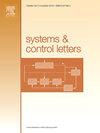基于稳定核尺寸自适应的最大熵卡尔曼滤波
IF 2.5
3区 计算机科学
Q3 AUTOMATION & CONTROL SYSTEMS
引用次数: 0
摘要
最先进的最大熵卡尔曼滤波器(MCKF)在其公式中加入高斯核,是一种强大的估计技术,可以增强传统卡尔曼滤波器(KF)对非高斯噪声的鲁棒性。然而,核大小的选择不当可能会降低估计性能或减慢收敛速度。本文通过开发一种基于投影的自适应MCKF (PAMCKF)来扩展和涵盖基线MCKF,该MCKF适用于具有一类非高斯噪声的连续时间线性系统:测量异常值主要是由于传感器故障,网络攻击等。我们建议一种利用创新信号来“在线”更新内核大小的自适应机制。然后,将所提出的自适应方法与改进版本的MCKF统一起来,以低计算量实现对测量异常值的鲁棒估计,而无需先验地知道它们的边界。本文的主要贡献是状态和核大小估计误差最终是一致有界的,这是用确定性Lyapunov稳定性论证正式证明的。对KF和MCKF进行了仿真和比较,验证了理论结果,并证明了所提出滤波器的优点。本文章由计算机程序翻译,如有差异,请以英文原文为准。
Stable kernel size adaptation-based maximum correntropy Kalman filter
The state-of-the-art maximum correntropy Kalman filter (MCKF) that incorporates Gaussian kernels into its formulation is a powerful estimation technique to robustify the traditional Kalman filter (KF) against non-Gaussian noises. However, improper selection of kernel sizes may either degrade the estimation performance or slow down the convergence rate. This paper extends and encompasses the baseline MCKF through the development of a projection-based adaptive MCKF (PAMCKF) for continuous-time linear systems with a class of non-Gaussian noises: measurement outliers that are mainly due to sensor failures, cyber-attacks, etc We suggest an adaptation mechanism that exploits the innovation signals to update “on-line” the kernel sizes. The proposed adaptive method is then unified with a modified version of MCKF to achieve robust estimation with low computational effort against measurement outliers without the need for knowing their bounds a priori. The main contribution of this paper is that state and kernel size estimation errors are uniformly ultimately bounded which is formally proven using a deterministic Lyapunov stability argument. Simulations and comparisons to KF and MCKF are carried out to validate the theoretical results and demonstrate the benefits of the proposed filter.
求助全文
通过发布文献求助,成功后即可免费获取论文全文。
去求助
来源期刊

Systems & Control Letters
工程技术-运筹学与管理科学
CiteScore
4.60
自引率
3.80%
发文量
144
审稿时长
6 months
期刊介绍:
Founded in 1981 by two of the pre-eminent control theorists, Roger Brockett and Jan Willems, Systems & Control Letters is one of the leading journals in the field of control theory. The aim of the journal is to allow dissemination of relatively concise but highly original contributions whose high initial quality enables a relatively rapid review process. All aspects of the fields of systems and control are covered, especially mathematically-oriented and theoretical papers that have a clear relevance to engineering, physical and biological sciences, and even economics. Application-oriented papers with sophisticated and rigorous mathematical elements are also welcome.
 求助内容:
求助内容: 应助结果提醒方式:
应助结果提醒方式:


